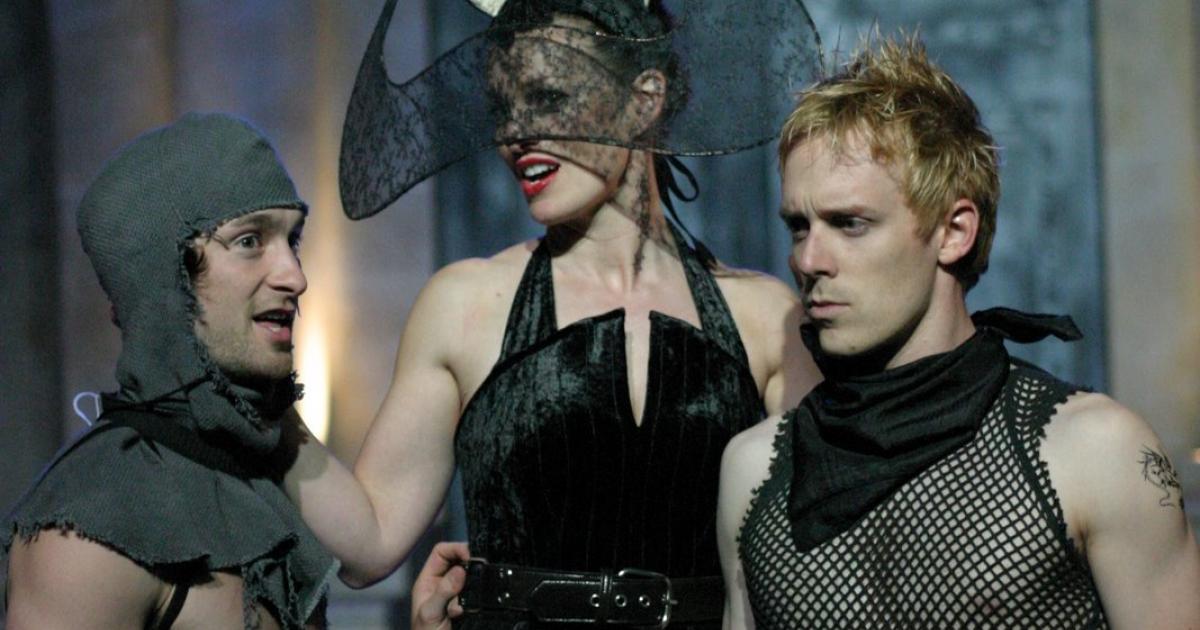Review From The House
READ IT • SEE IT • TASTE IT • LIVE IT
Rants, Raves and Occasional Reviews: Titus Andronicus

Rants, Raves and Occasional Reviews: Titus Andronicus
TITUS ANDRONICUS
by William Shakespeare
Directed by Jack Paterson
Jericho Arts Centre, Vancouver
VANCOUVER, B.C. - Who would have thought that Titus Andronicus, an early play in the Shakespeare canon, and unquestionably the most macabre, could supply such an excellent evening of entertainment. So hats off (or should we say hands off?) to director Jack Paterson and his cast for accomplishing this feat.
Apart from the occasional moment of having to get the literary critic part of my brain to beat down the medical critic part, my attention was riveted by the well paced action. Medical critic? Wouldn't poor detongued Lavinia have exsanguinated from the slicing off of her tongue and hands, long before Marca finds her wandering among the trees? And how about Titus? Well maybe the Romans had figured out how to staunch the bleeding from amputations on the battlefield and after all he only had one bleeding site to contend with.
Teryl Rothery and Keith Martin Gordey in Titus Andronicus Photo by Michael O'SheaOn that note, to digress for a moment. A similar thought was the one thing that bothered me about the excellent Tempting Providence production at the Cultch earlier this year. How could a nurse in the wilds of Newfoundland with no vascular microsurgery available reattach a severed leg? Or was that simply the mythology that grew up around this incredible woman? Maybe the medical critic should stay home as she does for opera, where heroines die, lungs destroyed by tuberculosis, singing exquisitely powerful arias.
Back to Titus, the play. Titus's incredible misjudgments that set the whole gory tragedy in motion remind me of King Lear. One can't help wondering "what could he be thinking?" Lear disowns the only daughter who loves him as father, not just as king. Titus, the great war hero, must be a good leader and therefore judge, of men, yet relinquishes the proffered role of emperor to the less than worthy, in fact positively unworthy Saturninus. One of the joys of reading Shakespeare is that so many of his characters provide endless material for debate and discussion.
Aaron is another great character, villainous predecessor of Edmund and of course, Iago. An interesting progression occurs between the early Titus and Othello. Aaron of course is a Moor, and the play is rife with nasty allusions to his colour. His vile machinations seem to arise from his insecurity about his race. Never repenting his evil deeds, (foreshadowing Don Giovanni, unrepentant seducer who burns in hell), Aaron is only minimally redeemed by his determination to save his infant son.
Shakespeare's second Moor, chronologically, is the tawny Moor, Prince of Morocco, in The Merchant of Venice, who asks to not be judged by his colour. Portia of course promptly does just that and rejects him.
By the time we reach Othello, the eponymous Moor is a great man and revered general, and the villain is Iago, his "ensign", presumably a Venetian. Although there are phrases like "old black ram tupping your white ewe", Othello is flawed, not because of his colour, but by his jealousy, an all too human emotion hardly restricted to any one race.
On opening night I found that the intimacy of the Jericho space heightened the tension and horror of the play. Several audience members looked distinctly queasy at the more gruesome moments. And I love it when every word is crystal clear so one need not strain to hear. Paterson's "trademark" transgendering of Marca/Marcus and Chiron made for some interesting interpretations particularly in the Chiron/Demetrius relationship. Set, costumes, lighting and uniformly good performances made for a show worth seeing. Who knows how long it will be before we see Titus in Vancouver again.